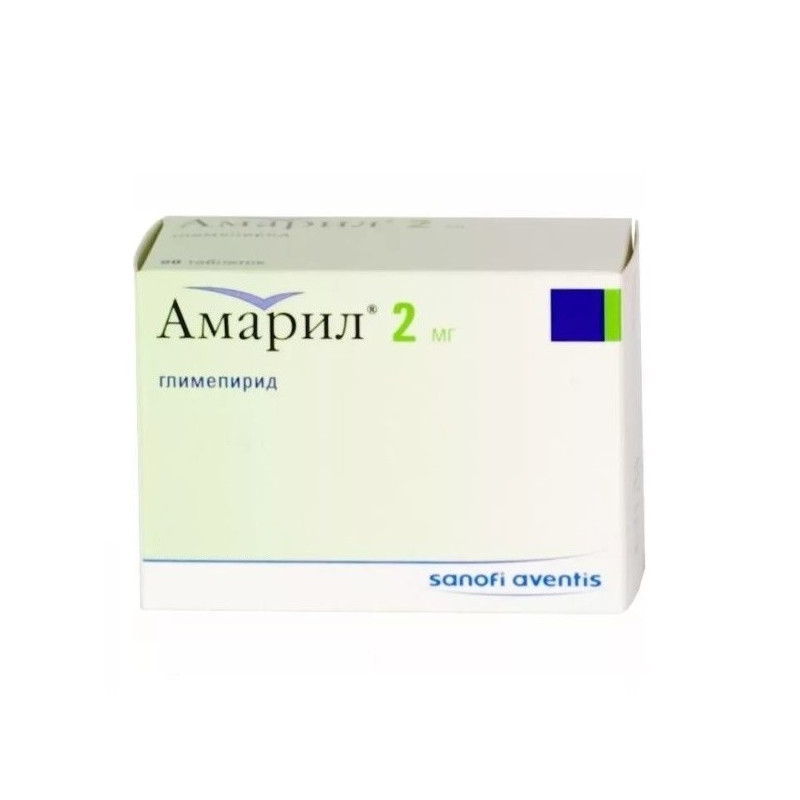



 All payments are encrypted via SSL
All payments are encrypted via SSL
 Full Refund if you haven't received your order
Full Refund if you haven't received your order
Metabolism: hypoglycemia, reduction of sodium in the blood.
Gastrointestinal: nausea, vomiting, epigastric discomfort, abdominal pain, diarrhea, increased activity of hepatic transaminases, cholestasis, jaundice, hepatitis (up to the development of liver failure).
Hemic and lymphatic: thrombocytopenia, leukopenia, erythropenia, granulocytopenia, agranulocytosis, pancytopenia, hemolytic or aplastic anemia.
Special senses: transient visual disturbances.
Allergic reactions: itching, urticaria, skin rash; rarely - dyspnea, fall in blood pressure, anaphylactic shock, allergic vasculitis, photosensitivity.
Amaryl is contraindicated for use in pregnancy. In the case of a planned pregnancy or if the pregnancy occurs, the woman should be transferred to insulin.
During lactation, a woman should be transferred to insulin.
AT experimental studies It is established that Glimepiride is excreted in breast milk.
Amaryl is prescribed with caution to patients with concomitant diseases of the endocrine system that affect carbohydrate metabolism (including thyroid dysfunction, adenohypophysial or adrenocortical insufficiency).
In stressful situations (with injury, surgery, infectious diseases, accompanied by fever), it may be necessary to temporarily transfer the patient to insulin.
It should be borne in mind that the symptoms of hypoglycemia may be smoothed out or absent altogether in elderly patients, patients with NCD or who are receiving simultaneous treatment with beta-blockers, clonidine, reserpine, guanethidine, or other sympatholytics.
The doses of Amaryl are determined by the level of glucose in the blood. Amaryl should be taken in prescribed doses and at the appointed time. The skip of the drug should never be corrected by the subsequent reception of a higher dose. The patient should immediately inform the doctor in case of receiving too high a dose of the drug.
Amaryl should be taken before a heavy meal (usually before breakfast). It is very important not to skip meals after ingestion of Amaryl.
At achievement of compensation of a diabetes mellitus sensitivity to insulin increases; therefore, the need for glimepiride may decrease during the treatment process. In order to avoid the development of hypoglycemia, it is necessary to reduce the dose in time or to stop Amaryl. Dose adjustment should also be carried out with a change in the patient's body weight or with a change in his lifestyle, or with the appearance of other factors contributing to the development of hypo- or hyperglycemia.
When switching to Amaryl from another drug, it is necessary to take into account the degree and duration of the effect of the preceding hypoglycemic drug.It may be necessary to temporarily discontinue treatment in order to avoid an additive effect.
In the first weeks of treatment, the risk of hypoglycemia may increase, which requires particularly strict monitoring of the patient. Factors contributing to the development of hypoglycemia include: irregular, malnutrition; changes in the usual diet; drinking alcohol, especially when combined with skipping meals; change in the usual regime of physical activity; simultaneous use of other drugs. Hypoglycemia can be quickly stopped by taking carbohydrates immediately.
Alcohol can enhance or weaken the hypoglycemic effect of Amaryl.
Control of laboratory parameters
During treatment, Amaryl requires regular monitoring of blood glucose and urine levels, as well as the concentration of glycated hemoglobin. Monitor monitoring of blood glucose and urine helps to detect primary or secondary drug resistance.
Influence on ability to drive motor transport and control mechanisms
Patients taking Amaryl should refrain from engaging in potentially hazardous activities that require increased attention and quickness of psychomotor reactions.
Symptoms: hypoglycemia, accompanied by such manifestations as increased sweating, anxiety, tachycardia, increased blood pressure, feeling of heartbeat, pain in the heart, arrhythmia, headache, dizziness, a sharp increase in appetite, nausea, vomiting, apathy, drowsiness, anxiety, aggression, disturbance concentration, depression, confusion, tremor, paresis, impaired sensitivity, seizures of central genesis. Sometimes the clinical picture of hypoglycemia may resemble a stroke. Perhaps the development of coma.
Treatment: diet correction; prescribe glucose inside or in / in. In severe cases, the patient must be hospitalized. In hypoglycemic coma, infusion therapy is administered with 40% glucose solution followed by infusions of a more diluted (10%) glucose solution in order to maintain blood glucose levels at 100 mg / dl.
Enhancement of the hypoglycemic effect. miconazole, para-aminosalicylic acid, Pentoxifylline (when injected in high doses), phenylbutazone, azapropazone, oxyphenbutazone, probenecid, quinolones, salicylates, sulfinpyrazone, sulfonamides, tetracyclines, tritoqualine.
Attenuation hypoglycemic action AMARE possible while the application of acetazolamide, barbiturates, corticosteroids, diazoxide, thiazide diuretics, epinephrine (adrenaline) and other sympathomimetics, glucagon, laxatives (after prolonged use), nicotinic acid (high dose), estrogens and progestogens, phenothiazine, phenytoin, rifampicin, thyroid hormones, lithium salts, chlorpromazine.
With simultaneous use of histamine H blockers2-receptors, clonidine and reserpine are able to both potentiate and reduce the hypoglycemic effect of Amaryl.
While taking Amaryl, the effect of coumarin derivatives may be enhanced or weakened.
The drug should be stored at a temperature not higher than 25 ° C.
Amaril, Glemaz.
